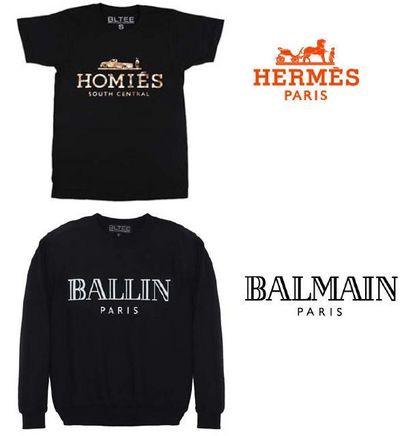 Fashion designer brotherly love – or hate – is demonstrated through a trademark infringement, trade secret misappropriation, unfair competition, intentional interference with contractual relations, defamation, libel, and slander lawsuit between brothers Brian Lictenberg and Christopher Lichtenberg and their respective companies. Brian alleges to be a successful designer and his designer parodies, substituting “Homiés” for “Hermés” and “Bucci” for “Gucci,” have become his claim to fame. Besides being possibly offensive to residents of South Central, depicting a man standing next to a broken down pick-up truck, it’s surprising that he hasn’t been sued for at least trademark dilution by these famous brands. Back to the regularly scheduled programming, this is not the first intra-family trademark infringement and trade secret misappropriation lawsuit.
Fashion designer brotherly love – or hate – is demonstrated through a trademark infringement, trade secret misappropriation, unfair competition, intentional interference with contractual relations, defamation, libel, and slander lawsuit between brothers Brian Lictenberg and Christopher Lichtenberg and their respective companies. Brian alleges to be a successful designer and his designer parodies, substituting “Homiés” for “Hermés” and “Bucci” for “Gucci,” have become his claim to fame. Besides being possibly offensive to residents of South Central, depicting a man standing next to a broken down pick-up truck, it’s surprising that he hasn’t been sued for at least trademark dilution by these famous brands. Back to the regularly scheduled programming, this is not the first intra-family trademark infringement and trade secret misappropriation lawsuit.
This lawsuit, however, appears to be less about trademark infringement – which claim appears to weak – and more about vitriol. Brian claims that Christopher “continues to struggle with alcoholism, depression and various other psychological disorders, that have contributed to Christopher’s actions which have given rise to the causes of action set forth in this Complaint.” What Brian doesn’t realize is that slapping a word and design on the front of a t-shirt does not establish trademark rights. Indeed, this is such a major misconception among clothing designers that the U.S. Patent & Trademark Office has published an advice page on how to avoid merely ornamental refusals: “For example, a slogan prominently displayed on the front of a t-shirt may be considered merely ornamental use and not trademark use. That is, most purchasers of the t-shirts would not automatically think the slogan identified the source of the goods but would view the slogan only as a decoration on the goods.” In other words, if you want the slogan to function as a trademark, put it on the neck label or a hang tag. Thus, judging from the pictures herein, Brian’s trademark – as applied to the neck label – is BLTEE and not “BALLIN PARIS” which appears to be merely decorative. The Homies artwork, on the other hand, may be copyrightable but that’s an issue for another lawsuit, amended complaint, or counterclaim. But if Brian insists that his “Homies” parody is indeed his trademark, he may be opening himself up to a third-party trademark infringement lawsuit by the owner of the USPTO registered Homies apparel trademark.
Brian claims that after an email exchange with Kanye West where the word “Ballin” was used, Brian came up with the idea to create the “Ballin Paris” artwork as a purported parody of the “Balmain” trademark, using a similar font. Brian allegedly disclosed this information to Christopher and because he had “felt sorry for his younger brother’s failing [Alex & Chloe] business,” Christopher had been allowed to sell Brian’s merchandise on consignment as a favor. Christopher is accused of breaching the agreement to pay Brian for the merchandise sold on the Alex & Chloe website. And it’s alleged that Christopher “was a failed fashion and jewelry designer overshadowed by the financial and creative success of Brian” and, as a result, Chris’ “desperation for money caused him to set out to steal the “Ballin” parody design from Brian” and to create various “knock-off merchandise and apparel that look and feel identical to that of Brian’s products and designs.”
But what may be another problem for Brian is the allegation that Christopher worked as a part-time contractor on the Ballin project, which included “his usual graphic design duties as well as creating a mailing list.” Missing from the complaint and the exhibits is any notion that Christopher executed an independent contractor agreement — which must be in writing — affirming a work for hire relationship whereby all rights were transferred to Brian. Further, Brian’s admission that unrelated third-parties are also selling designer parodies, e.g. “Ballincieago,” may affect his “Ballin” ownership claim.
Brian also alleges that Christopher contacted Brian’s manufacturer and had knock-offs made and sold to Brian’s retailers, even going so far as sending a cease and desist letter to one of Brian’s retailers and asserting that Brian stole the design from Chris. Upon Brian’s discovery of Christopher’s communications with Brian’s customers and vendors, Christopher was sent a cease and desist letter on February 25, 2013. Because Christopher failed to cease his conduct, Brian filed the complaint. It appears, however, that Christopher first filed a complaint in Los Angeles Superior Court in March of this year, Case No. BC503835. A sentence from Brian’s complaint confirms that there will be no winners from either lawsuit: “While Defendants may profit from this malicious crusade, it will likely backfire such that all parties lose in a manner that is irreparable due to the small fashion world in which the parties operate.”
The case is Brian Lichtenberg, LLC v. Alex & Chloe, Inc. et al., CV13-06837 DDP (C.D. Cal. 2013).
 Los Angeles Intellectual Property Trademark Attorney Blog
Los Angeles Intellectual Property Trademark Attorney Blog

